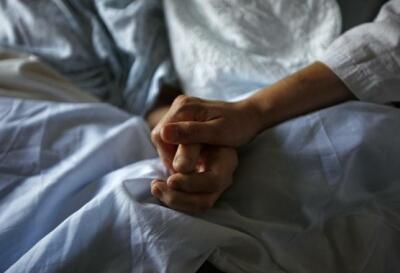British Medical Association remains opposed to assisted suicide
The British Medical Association, the trade union for doctors in the United Kingdom, has maintained its stance against assisted dying despite the pressure it received to "go neutral" on the subject.

"I am delighted this attempt to force the BMA into a position of neutrality on assisted suicide has failed," said CARE Chief Executive Nola Leach, as quoted by Premier. "This was a cynical effort to try and silence a respected opponent of assisted suicide and it is clear a move towards neutrality would have been a stepping stone towards full support for assisted suicide."
At the Annual Representatives Meeting in Belfast on June 21, 63 percent voted against taking a neutral stance on the issue -- 198 of 313 wanted the group to continue to oppose assisted dying, a wide margin to the 115 who voted in favor of neutrality, the report says.
"Adopting a neutral position on this ethically charged issue would have been highly dangerous and it would also have represented a colossal failure of leadership," said Leach.
The BMA has said before that it "opposes all forms of assisted dying" and supports the legal position that "allows compassionate and ethical care for the dying." They insist that physician-assisted suicide, voluntary euthanasia, and non-voluntary euthanasia should not be made legal in the U.K., and in the case that euthanasia does become legal, "there should be a clear demarcation between those doctors who would be involved in it and those who would not."
Among those who have been calling for the BMA to take a neutral stance is the group Dignity in Dying, formerly called the Voluntary Euthanasia Society.
"Unsurprisingly, the BMA has chosen to remain opposed to assisted dying," said Sarah Wootton, Chief Executive of Dignity in Dying. "By making this decision, the BMA is not only wilfully ignoring the evidence but also the suffering of dying patients. In an attempt to stifle debate, opponents of assisted dying speaking during the debate accused members of the public who were handing out briefings outside of intimidation - a disgraceful and entirely false claim which highlights their dismissal of public opinion."
The BMA's position is not in line with that of the general public, said Wootton, as only 7 percent agree with the BMA opposing assisted dying. On the other hand, 82 percent support it, and 84 percent think that BMA should change its stance.
"The BMA has never surveyed its own members about their views on assisted dying," she said. "How can it claim to speak on behalf of 170,000 doctors across the UK without ever having asked them what they think?"
In September 2015, Members of Parliaments voted 330-118 against a bill that would legalize assisted suicide.
 Christians don't have to affirm transgenderism, but they can’t express that view at work: tribunal
Christians don't have to affirm transgenderism, but they can’t express that view at work: tribunal Archaeology discovery: Medieval Christian prayer beads found on Holy Island
Archaeology discovery: Medieval Christian prayer beads found on Holy Island Presbyterian Church in America votes to leave National Association of Evangelicals
Presbyterian Church in America votes to leave National Association of Evangelicals Over 50 killed in 'vile and satanic' attack at Nigerian church on Pentecost Sunday
Over 50 killed in 'vile and satanic' attack at Nigerian church on Pentecost Sunday Ukrainian Orthodox Church severs ties with Moscow over Patriarch Kirill's support for Putin's war
Ukrainian Orthodox Church severs ties with Moscow over Patriarch Kirill's support for Putin's war Islamic State kills 20 Nigerian Christians as revenge for US airstrike
Islamic State kills 20 Nigerian Christians as revenge for US airstrike Man who served 33 years in prison for murder leads inmates to Christ
Man who served 33 years in prison for murder leads inmates to Christ


 Nigerian student beaten to death, body burned over ‘blasphemous’ WhatsApp message
Nigerian student beaten to death, body burned over ‘blasphemous’ WhatsApp message 'A new low': World reacts after Hong Kong arrests 90-year-old Cardinal Joseph Zen
'A new low': World reacts after Hong Kong arrests 90-year-old Cardinal Joseph Zen Iran sentences Christian man to 10 years in prison for hosting house church worship gathering
Iran sentences Christian man to 10 years in prison for hosting house church worship gathering French Guyana: Pastor shot dead, church set on fire after meeting delegation of Evangelicals
French Guyana: Pastor shot dead, church set on fire after meeting delegation of Evangelicals ‘Talking Jesus’ report finds only 6% of UK adults identify as practicing Christians
‘Talking Jesus’ report finds only 6% of UK adults identify as practicing Christians Mission Eurasia ministry center blown up in Ukraine, hundreds of Bibles destroyed: 'God will provide'
Mission Eurasia ministry center blown up in Ukraine, hundreds of Bibles destroyed: 'God will provide' Church holds service for first time after ISIS desecrated it 8 years ago
Church holds service for first time after ISIS desecrated it 8 years ago Burger King apologizes for 'offensive campaign' using Jesus' words at the Last Supper
Burger King apologizes for 'offensive campaign' using Jesus' words at the Last Supper Uganda: Muslims abduct teacher, burn him inside mosque for praying in Christ’s name
Uganda: Muslims abduct teacher, burn him inside mosque for praying in Christ’s name